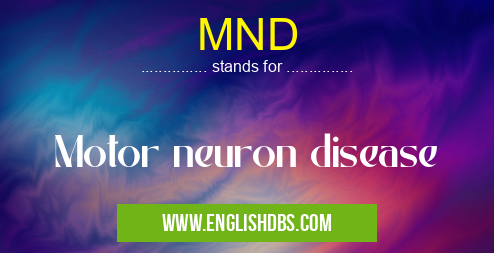What does MND mean in REHABILITATION
Motor neuron disease (MND) is a progressive neurological condition that affects the neurons in the brain and spinal cord. It is a complex disorder, with symptoms ranging from muscle weakness and stiffening to difficulties with breathing, eating, speaking and swallowing. MND can lead to problems with everyday tasks such as dressing, washing or going to work. The cause of MND is often unknown however genetic mutation and environmental factors are believed to play a role in its development. There is no cure for MND but there are treatments available which help manage symptoms and improve quality of life.

MND meaning in Rehabilitation in Medical
MND mostly used in an acronym Rehabilitation in Category Medical that means Motor neuron disease
Shorthand: MND,
Full Form: Motor neuron disease
For more information of "Motor neuron disease", see the section below.
Symptoms
The early signs of motor neuron disease can be difficult to spot because they may only affect one part of the body at first. Common symptons include: Muscle weakness (often starting in the hands, feet or face); Twitching and cramping in muscles; Poor coordination; Slurred speech; Drooling; Difficulty chewing or swallowing; Breathlessness; Weight loss due to difficulty eating. As the disorder progresses more severe symptoms such as respiratory failure may develop.
Diagnosis
MND can be difficult to diagnose because its early symptoms can be similar to those seen in other disorders such as muscular dystrophy or multiple sclerosis. A doctor will take a detailed medical history, do physical examinations and order laboratory tests before making a definitive diagnosis. Additional tests such as an electromyography (EMG), nerve conduction study (NCS), imaging scans (CT or MRI) may also be requested by the doctor if they think it necessary.
Treatment
There is no cure for motor neuron disease however there are treatments available that can help manage symptoms, slow down progression and improve quality of life. These include medications such as riluzole which reduces nerve damage by blocking glutamate receptors; physical therapy which helps maintain muscle strength by providing regular exercise regimes; speech therapy which teaches patients how to better communicate their needs via non-verbal means; assisted breathing devices which provide oxygen therapy when needed; nutritional supplements that provide additional nutrition when eating becomes difficult etc...
Essential Questions and Answers on Motor neuron disease in "MEDICAL»REHABILITATION"
What is motor neuron disease?
Motor Neuron Disease (MND) is a group of neurological diseases which affect the cells that control voluntary muscle activities like speaking, walking, breathing, and swallowing. These cells are called motoneurons, which travel from the brain to the spinal cord and out to our muscles throughout the body. In people with MND, these cells stop working or die, causing the muscles to weaken or waste away
Final Words:
Motor neuron disease is a progressive neurological condition that affects the neurons in the brain and spinal cord leading to problems with everyday living tasks. While there is no known cure for MND, treatment is available which helps manage its symptoms, slows down progression and improves quality of life. If you experience any of the above listed symptoms it's important that you see your doctor right away for diagnosis and treatment.
